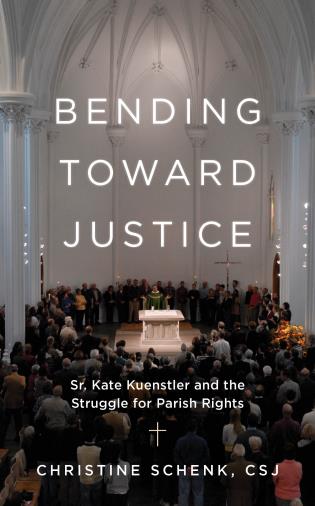People gather in St. Peter’s Square at the Vatican for the opening Mass of the Synod of Bishops on Synodality, presided over by Pope Francis, Oct. 2, 2024. (CNS/Lola Gomez)
After the clergy sexual abuse scandal came to light in 2002, the Archdiocese of Boston faced $85 million in victim settlements and a financial crisis. One solution – with catastrophic results – was widespread parish closures. Under this backdrop, Sr. Kate Kuenstler, equipped with a profound knowledge of canon law, became an advocate for the laypeople affected.
Kuenstler spearheaded numerous legal challenges against unjust parish closures that culminated in an unprecedented outcome: the Vatican ordering the reopening of 12 improperly closed parishes in Cleveland. In Bending Toward Justice: Sr. Kate Kuenstler and the Struggle for Parish Rights, Christine Schenk, CSJ, tells her story.
Church authorities too frequently confuse the parish, a vibrant community of faith, with a corporate entity assessed by economic and administrative criteria. They might initially recognize the spiritual vitality and pastoral importance of a community only to subsequently use administrative benchmarks to justify its closure.
Kuenstler aptly captures this contradiction, noting, "Bishops frequently assess parishes based on criteria suited to faith communities, which is appropriate. However, they ultimately conclude that, because the parish does not meet certain administrative benchmarks, the corporate entity must close."
This contradiction creates profound inconsistency, leading laypeople to feel demoralized, as their community, spiritual experiences and human dignity seem secondary to financial or administrative criteria.

Bending Toward Justice vividly illustrates the experiences of many communities whose identities are threatened by centralized decisions that fail to consider local realities. Parish closures disproportionately impact ethnic and economically disadvantaged communities, where a parish transcends the mere function of a worship space. Here, the parish serves as an essential space of identity, embodying the living history and struggles of the community. Here, daily experiences, cultural identities and collective memories of the people who have invested generations of faith are represented. Here, both people and buildings bear testimony to God's presence within the unfolding narrative of their communal life. Here, faith is expressed not only through individuals but through the sacred spaces that nurture and sustain generations of believers.
Kuenstler's advocacy is a "theology of the people": faith lived from within grassroots community realities. Here, laypeople are portrayed not merely as passive recipients of faith but as active participants who shape, sustain and defend their spiritual heritage. Her story powerfully embodies the preferential option for the poor, a central principle of Catholic Social Teaching that insists on prioritizing the voices and well-being of the marginalized in both church and societal decision-making processes. Indeed, many of the closed parishes discussed in the book belonged to marginalized communities whose voices were disregarded during the closures.
This compelling narrative invites readers to reflect deeply on the authentic meaning of ecclesial community: a church not constrained by bureaucratic structures and rigid norms but one that truly incarnates God's presence in the lived experiences of its people. The reopening of parishes transcends physical restoration or legal victories: It is fundamentally an acknowledgment of the faith lived and nurtured within communities, affirming ecclesial identity, promoting communal justice and, ultimately, underscoring the imperative that any genuine pastoral transformation must always originate from the lived experiences of faith communities themselves.
Bending Toward Justice critically reflects upon how clerical decisions can inadvertently harm community life, urging a reexamination of decision-making processes within church leadership. The successful challenges against unjust parish closures represent a robust affirmation of a church genuinely rooted in communal life. Authentic pastoral transformation, therefore, must prioritize meaningful dialogue with laypeople, ensuring their active involvement in all ecclesial decisions.
So, too, must we ensure lay empowerment in times of ecclesial crisis. Facing hierarchical decisions made without sufficient dialogue or communal discernment, leaders like Kuenstler played a crucial role in accompanying and empowering laypeople in defending their parish communities. The crisis of 2002 awakened a renewed critical consciousness among many faithful, deepening their communal commitment and inspiring them to actively demand genuine spaces for dialogue, transparency and meaningful participation within church governance.
In doing so, the book suggests laypeople planted seeds for a synodal transformation within the church. As Kuenstler states: "I had a mission: to be a disciple and help people use their voice and rightful place in the Church, enabling them to speak for themselves. None of this changed with the events that unfolded. I decided to stay and fight from within. In some ways, I was not surprised, given similar situations I had witnessed in other dioceses where I previously worked."
How can parish restructuring transcend mere administrative concerns to become a process of building egalitarian communities? The baptismal priesthood is shared by all believers. Laypeople are not merely part of the church, they embody the church, with rights and responsibilities to build God's kingdom.
Readers are left with compelling questions. If the Vatican recognized these communities' rights by reversing unjust decisions, what other rights await full acknowledgment by church authorities? Who among our communities will heed this prophetic call, raising their voices for a more just, inclusive and synodal church?
Advertisement





